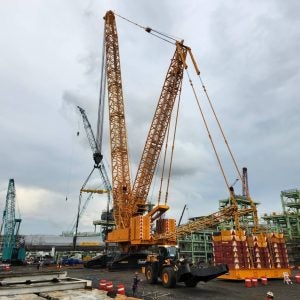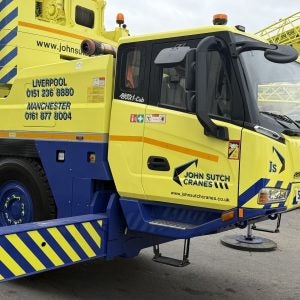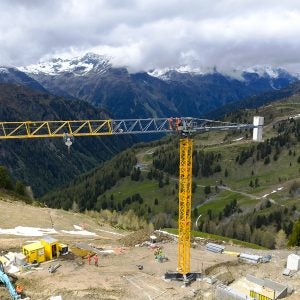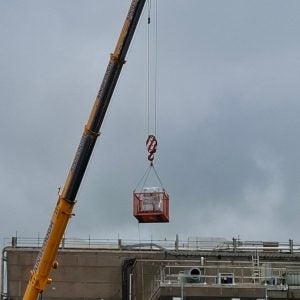“We are in an environment of “tough times, requiring tough choices, but I believe we have a great future”. This letter is all about where we are and where we are going.
“The environment around us is troubling. We all read and hear the news reports and, at Terex, we are living the consequences. We have always operated the Company based upon what we can do to change our future rather than to complain about the world around us. Today is no different.
“The depth and duration of the global economic decline are not known. In the markets we serve, we have seen unprecedented declines in retail activity. This means that 2009 will be the most challenging year we have faced in more than a decade. We will operate the company based upon the most realistic assessment we have about our businesses and markets. This backdrop, albeit a negative one, is important to understand as the framework for our management initiatives. Tough times – but our team members and Businesses are up for it.
“Within Terex today, many of our businesses have very strong global franchises and are capable of weathering this storm. Some of our businesses are less capable, and we will fix, merge or sell these. I want to compliment our aerial work platforms team that faced an incredibly challenging market in 2008 and will continue to face these challenges in 2009. This team did not reflect upon the glory of prior days, even though there was much to be proud of with high market shares and profitability. Instead, they went right to work properly sizing the business for these uncertain times. Since June 2008, we have had to reduce their number of team members by over 40% and, despite this, we have made progress with new products, after sales parts and service initiatives, Asian expansion and building the team in ways that will improve the future.
“The cranes team has built a truly global and profitable business. This business is typically stronger later in the economic cycle and, reflecting upon the 2008 numbers, illustrates the strength of this franchise. Revenue reached an all time high of $2.9 billion and the operating margin an excellent 13.9%. This is a great business and we believe it is getting better with the larger products maintaining a good backlog and positive outlook at least for the first half of 2009. During this past decade, we have come from an “also ran” in the crane business to one of the best in the world and we are working across the world to become number one.
“The mining team had a great 2008 and some strength continues. This is a good business for us. I realise that the short-term outlook for commodities is negative and therefore the conventional wisdom is that the best has already passed for this business. I do not agree. We have innovative new products in development and we think we can recapture some business, particularly with our larger trucks. Our customers tell us we have excellent equipment that is highly productive, but we need to improve our product support. We are working on this and expect this franchise to continue to strengthen over the coming years. We have produced excellent profitability. Though the robust revenue growth experienced over the past couple of years is unlikely to return right away, we believe this business has a positive future and that we have a durable franchise.
“Our materials processing business is one of the best in its class. This is the business that makes “big rocks into small ones” and then separates them for the aggregate industry, along with other applications. We have one of the top mobile equipment franchises in the world and since 1999, when we made our first investment in these businesses, they have been nicely profitable. During the second half of 2008, however, we experienced a severe drop off in orders and we made rather dramatic manufacturing shutdowns to compensate. We expect this to continue for a good portion of 2009, which will make strong profitability challenging in the near-term. However, we are well positioned in the global market with good distribution. As soon as the economic conditions allow, we believe this business will recover rapidly. A number of our businesses in our Terex Construction segment require significant change to return to profitability. We have small market shares in some big markets and the activities of 2008 did not adequately anticipate the severe economic downturn. Despite this, we made real progress on product quality, and the building of a competitive compact equipment line.
“We have good market shares in some markets and a niche position in others. However, material cost increases, the concentration of European revenue, coupled with the virtual turnoff of developing market revenue, has put severe pressure on our cost structure and prospects for this business.
“We will make changes, as necessary, in these businesses in 2009. The road building business made progress in 2008 despite some of the negative market trends. However, we are still mainly a US business and insufficiently diversified. The cement mixer business, coupled with our bridge businesses, have excellent potential. Also, we have done a nice job in Brazil and Africa with our paver and asphalt plant businesses.
“We will look to build on these successes in 2009. Our utility business completed several operational initiatives in 2008 and we believe these will help performance in 2009.
As the operations progressed so did our maturity as a company. We continued our Terex business system initiatives, continued implementation of our enterprise-wide management system, hired and trained a worldwide supply chain team, significantly improved our new product development process, moved the company forward on diversity hiring and had a second consecutive year of safety improvements, with a 25% reduction in lost time accidents. We also began a graduate development programme so that our future leaders can be internally grown. Furthermore, we have improved our developing market talent base and have meaningful initiatives underway in India, Russia, China, the Middle East and Latin America.
“We will continue these initiatives even in the tough times of today.
“With many of our markets down more than 50% we cannot avoid the inevitable changes in employment and the disruption that comes with this sudden change in customer demand. It seems as if we went from full production levels in many of our businesses in late 2007 and early 2008 to nearly a dead stop towards the end of 2008. Many of our customers have the ability to stretch out their equipment asset lives and this is the smart thing for them to do in a period of economic uncertainty. During these times, rental companies stop buying and distribution companies that are fighting for their economic lives often try to send back equipment and seek to monetise assets to stay alive. All this affects our operations.
“As a result, we have had, and will continue to have, numerous shutdowns of plants for extended periods. During January and February, I visited with and spoke to the leadership of our company and held town hall meetings with several thousand of our team members. I am amazed with their positive attitude, along with their dedication to Terex, despite being told the negative news of job losses and shorter work weeks. It is unfortunate that we have had to see many of our friends and loyal Terex team members depart. We wish them well and trust we have treated them with the respect and dignity that they deserve.
“These decisions are made to preserve cash. During various shareholder visits, many have asked me if we are prepared for the 1,000-year flood that we seem to be experiencing. My answer is that we are better prepared than we have ever been and since none of us remembers a 1,000-year flood, we plan to do our best and expect to be successful. The key to success in this uncertain economic environment is preservation of cash and the generation of free cash flow. Consequently, only the most essential capital expenditures will be made and working capital reductions will be our focus. In the short run we will struggle to shut off incoming material faster than our declining order and production rates.
“However, as 2009 develops, we expect to generate meaningful reductions in inventory and to be able to bring orders, inventory and production back into balance. We believe this focus on cash management, plus the availability under our credit facility, should be sufficient to get us through the worst of the economic downturn.
“We are also going to attempt to divest non-core operations. It is not our practice to specify these assets but we have begun the process on some of our smaller businesses and we expect to make progress in this area by the end of the current year, assuming we can find logical buyers and receive an appropriate valuation. It is important to prune, and in times of economic uncertainty, this is a must.
“As you may know, I recently declined my 2008 bonus. From a performance perspective, our compensation committee evaluated my performance and determined that I was entitled to an approximate $1.2m bonus. However, given the pain that is being experienced around the company, these funds will be better spent helping many of our current and former team members through this challenging period. I have been very fortunate to lead Terex for many years and have always been treated fairly. If the stockholders do well, I will be amply rewarded. I expect over the next several years to help make this happen.
“A crisis is a terrible thing to waste. As uncertain times pass and we return to a more normal economic environment (however this is defined), we are positioning Terex to capture the momentum that is contained in an improving market that will be inevitable. We are positive about this future and optimistic that we are doing the right things to prepare for it. Some of these things are worth noting.
“We have adjusted production to meet demand and have been careful not to load our dealers and customers with inventory. We believe that our customers have been more responsible in this downturn, but the downturn has been more severe than anticipated. Consequently, even as things improve, it will take a while to pull retail demand through. We also do not believe that the market will recover evenly around the globe, making it somewhat harder to predict the future.
“So, while 2009 will be a very difficult year to predict, we do believe we will use this time to restructure, resize, generate cash and seek strategic solutions. We will not sit on the sidelines and wait until things get better to make decisions. However, we will evaluate the financial markets first and be cautious not to act until the financial institutions begin to recover.
“We will look a little different in the future than we do today. Just how different is hard to predict, but you can expect us to keep you informed as we move forward. We remain committed to return on invested capital as our unifying metric, and believe that our best businesses will come back even stronger than before.
“The Terex board of directors added two outstanding new members at the annual meeting in 2008. This brings the total board membership to 11; all independent by NYSE rules except, of course, for me. David Wang is currently president of Boeing China and resides in Beijing. He brings a broad base of experience with a career at general electric in Asia and the US prior to joining Boeing. Tom Hansen is currently vice chairman at Illinois Tool Works. Both David and Tom bring operational and strategic experience to the boardroom and have already made excellent contributions to our governance.
“We established a new board committee and made some leadership changes. The new corporate responsibility and strategy committee is chaired by Paula Cholmondeley. This committee provides oversight and support to management in the important areas of social responsibility, safety, environment and strategy. This new committee has met several times and is off to an excellent start. Helge Wehmeier now chairs the governance and nominating committee, which is allowing our lead director, Chris Andersen, to participate in all our committees, as appropriate. Don DeFosset and David Sachs continue to chair our audit and compensation committees, respectively, providing continuity on these hard working committees.
“We completed 10 business practices seminars, which allowed the senior management team to personally advise 346 team members on the company’s compliance standards. This is a practice we began in 2005 and an estimated 1,070 leaders of Terex have completed this day of compulsory training.
“Management continues to evolve throughout the company as we have made some operational and structural adjustments. Colin Fox, former Terex senior vice president, has retired and we wish him well. He was a key architect of the Terex business system. George Ellis has replaced Colin and has great lean manufacturing experience. Key positions were filled in each of our operating units as talent continues to be realigned to meet the challenges of the current economic environment. We also conducted several leadership development programs during the year.
“Lastly, we conducted 360-degree skill assessments and performance reviews for the top 14 executives of the company, including me. These have allowed us to have more robust dialogue on how we can improve our leadership skills and interactions. We remain committed to continuous improvement.
“We expect your company to strengthen as we build for our future. We had the wind at our back for a number of years and now we face some very stiff headwinds. The quality of the businesses we own are very good and getting better. We are dedicated to portfolio management, cost reduction and cash management in the short-term. We will be looking to exit the current downturn stronger than we went in, even if it is longer than we might hope.”






